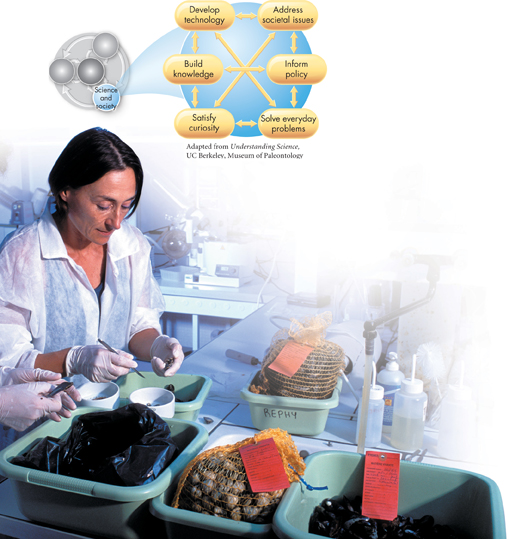Science and Society
 What is the relationship between science and society?
What is the relationship between science and society?
Make a list of health-related things that you need to understand to protect your life and the lives of others close to you. Your list may include drugs and alcohol, smoking and lung disease, AIDS, cancer, and heart disease. Other topics focus on social issues and the environment. How much of the information in your genes should be kept private? Should communities produce electricity using fossil fuels, nuclear power, solar power, wind power, or hydroelectric dams? How should chemical wastes be disposed of?
All these questions require scientific information to answer, and many have inspired important research. But none of these questions can be answered by science alone. These questions involve the society in which we live, our economy, and our laws and moral principles.  Using science involves understanding its context in society and its limitations. Figure 1–10 shows the role science plays in society.
Using science involves understanding its context in society and its limitations. Figure 1–10 shows the role science plays in society.
Science, Ethics, and Morality When scientists explain “why” something happens, their explanation involves only natural phenomena. Pure science does not include ethical or moral viewpoints. For example, biologists try to explain in scientific terms what life is, how life operates, and how life has changed over time. But science cannot answer questions about why life exists or what the meaning of life is. Similarly, science can tell us how technology and scientific knowledge can be applied but not whether it should be applied in particular ways. Remember these limitations when you study and evaluate science.
Avoiding Bias The way that science is applied in society can be affected by bias. A bias is a particular preference or point of view that is personal, rather than scientific. Examples of biases include personal taste, preferences for someone or something, and societal standards of beauty.
Science aims to be objective, but scientists are human, too. They have likes, dislikes, and occasional biases. So, it shouldn't surprise you to discover that scientific data can be misinterpreted or misapplied by scientists who want to prove a particular point. Recommendations made by scientists with personal biases may or may not be in the public interest. But if enough of us understand science, we can help make certain that science is applied in ways that benefit humanity.

FIGURE 1–10 Science and Society Science both influences society and is influenced by society. The researcher below tests shellfish for toxins that can poison humans. Form an Opinion Should shellfish be routinely screened for toxins?
ddTable of Contents
- Formulas and Equations
- Applying Formulas and Equations
- Mean, Median, and Mode
- Estimation
- Using Measurements in Calculations
- Effects of Measurement Errors
- Accuracy
- Precision
- Comparing Accuracy and Precision
- Significant Figures
- Calculating With Significant Figures
- Scientific Notation
- Calculating With Scientific Notation
- Dimensional Analysis
- Applying Dimensional Analysis




